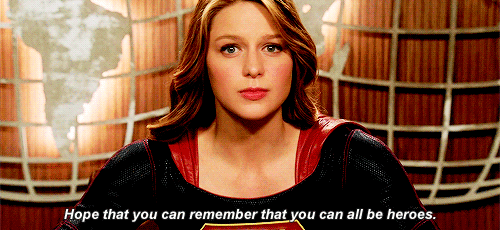We all have favorite shows here on The Fandomentals, some we love to love and some we love to hate. It’s no real secret that two of my love to love shows are Supergirl and Steven Universe. Supergirl actually won our Best of 2016 poll, while Kylie (rightly) dubbed Steven Universe the smartest show on television. When you think about it, they have a lot in common thematically. On a narrative level they both have a commitment to diverse storytelling and exploring trauma and darkness while maintaining a hopeful tone. The protagonists themselves share a lot of similar traits, too; in fact, they’re practically the same damn character.
That’s right, it’s time for another installment of ‘separated at draft’, the series where we explore how two (or more) different characters have strikingly similar personalities, arcs, and themes. Don’t be fooled by their puppy dog superheroes exteriors. They may be rays of sunshine and friends with everyone, but they’re significantly more complex that. As heroes, they bust more tropes than they fulfill, which explains why their shows are such beacons of hope in our predominantly Grimdark TV landscape.
Not (Fully) Human
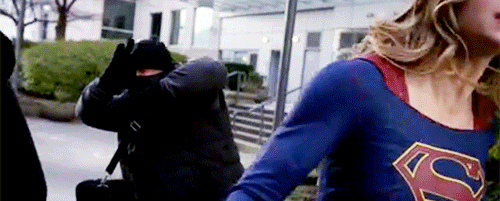
Kara hails from Krypton; Steven is basically a gem/human fusion. That’s all there is to this, right? They’re not fully human entities. But it’s deeper than genetics; their unique physiology signifies a struggle within themselves. They’re one of a kind (or one of a handful of surviving Kryptonians in Kara’s case) alien or half alien beings living amongst humans trying to honor both aspects of their heritage.
Make no mistake, Kara is an alien. It’s a fact easily lost given that her cousin Superman was raised on Earth. The show itself pays homage to Kara being more ‘mentally’ an alien when Superman himself falls prey to Myriad but not Kara. Having been raised in human culture, Clark Kent has basically fully enculturated to being ‘human’. Kara, on the other hand, arrived on earth as a young teen. She may be able to successfully navigate human society, but she is still ‘alien’.
At the same time, she’s lived all of her adult and most of her teenage life in human society. She believes being ‘human’, or at least having a ‘normal’ life as a human, is important. And not just because it was drilled into her as a child from her adoptive parents.
“All I know is being Kara is just as important as being Supergirl.” — Clark Kent, to Kara (2.01)
“Last year was all about figuring out how to be Supergirl, and now? Now it’s time I figure out how to be Kara.” —Kara, to James Olsen (2.01)
‘Being Kara’ meant embracing that while an alien, life outside of being a superhero mattered. She did not want to reduce herself to only a superhero. Because being a superhero, in some sense, reinforces her alien nature, as her powers stem from how her alien physiology interacts with the Earth’s climate. To be no more than ‘Supergirl’, then, is to be defined by her status as an alien. Yes, she’s helping people as Supergirl, but it’s a life that consistently reinforces that she does not ‘belong’ on Earth. It distances her from human life by defining her identity solely in terms of what makes her different from humanity. And Kara is and wants more than that.
Growing up, finding a regular job may have started out as a chance for her to live a ‘normal’ life separate from being a superhero like her cousin. But for Kara, her job at CatCo as Cat’s assistant and then as a reporter came to represent more than just a chance to ‘be normal’. Even after she donned red boots and emblazoned the house of El sigil on her supersuit, she refused to leave her ‘day job’ and work full time as a superhero. Her job was a part of who she was, a way to help people that didn’t require a cape.
“When I write, I don’t need a yellow sun, it’s just me. Supergirl is what I can do; Kara is who I am. I really loved that job.” — Kara
Working for CatCo grants Kara a chance to be ‘human’, that is, a chance to help and relate to people as more than just a superhero with freeze breath and super strength. Part of what I love most about both of the Supers (when at their best) is their steadfast refusal to life apart from humanity. Rather than set themselves up as gods, they live and work in the ‘rank and file’. It’s much more of a conscious choice for Kara than for Kal, since she wasn’t raised from infancy on a farm as a human until her powers set her apart. And that’s what makes her even more special. Because she values being a human hero as much as being a superhero (just watch 1.07, “Human for a Day”).
“Isn’t it also human to face our weaknesses and rise above them? Act like a superhero, even if you aren’t one? … And, no, we can’t do what Supergirl does, but we choose who we want to be. We must choose to do what we can.” — Cat Grant (1.07, “Human for a Day”)
Steven, likewise, must balance the human and the alien. It’s not a primary focus of the show as much as it is with Supergirl, but the threads are still there, especially early on. Like, Kara, Steven was raised both in human and alien societies, though he’s had greater contact with both aspects of his gem/human self. Greg raised him for most of his early life, presumably as any ‘normal’ human. Or as normal as one can get with Greg as your father.
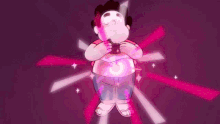
Like, Kara, Steven’s first season arc focused primarily on learning, developing, and training with his alien superpowers. In fact, he’s had far more of a struggle connecting to his alien half than his human half given how slowly his powers manifested. He’s more like Clark Kent that way. He understands what it means to be human, but less so what it means to be an alien.
Still, Steven doesn’t quite fully fit in human society either. He’s probably never been to school (see 4.03, “Buddy’s Book”). His contact with the Crystal Gems from a young age meant that his perception of ‘normal’ human life was always going to be colored by their existence in his. Like Kara, he would have been fully aware he was different. It’s hard to hide that gem in his belly button, even if he can physically ‘pass’ for human elsewise.
And as much as Greg would have likely tried to give Steven as normal a life as possible, the fact that Steven’s mother was a Crystal Gem added a layer of insecurity to Greg’s already normal anxiety about being a father. From what we’ve seen in flashbacks (4.10, “Three Gems and a Baby”), both Greg and the rest of the Crystal Gems approached Steven with a tentativeness and Otherness that would have marked Steven’s self-perception from a young age.
“I’m going to become half of you…You’re going to be a human being.” — Rose (1.35 “Lion 3: Straight to Video”)
He was a human being. As well as “not Rose” (4.10) as well as Rose being “half of him”. That’s a lot of mixed signals.
Then you have episodes like “Rocknaldo” (4.18) that challenge Steven’s perception of being a Crystal Gem. Ronaldo believes he knows more than Steven what being an alien is like because he is an outsider in human society. He knows what it means to ‘not fit in’ (he doesn’t, at least not the way Steven does, but that’s beside the point). The interaction forces Steven to think about the difference between what he does and who he is.
“The Crystal Gems are about love and acceptance! But you’ve been acting really mean to me, and I don’t love that. I don’t accept that. I wish I hadn’t snapped at you, it’s just… I really thought you joined because you were interested in the Crystal Gems. But the second it wasn’t about you, you stopped caring. This isn’t the Bloodstone club about making Bloodstone feel good. This is my whole life! Do you care about that or not?!” — Steven
On the one hand, Steven acknowledges that the Crystal Gems represent more than being a literal superpowered alien. Just like Kara, Steven believes people can be heroes without the need for alien or metahuman powers. Otherwise, characters like Connie would not be ‘allowed’ to work with the Crystal Gems.
At the same time, Steven gives voice to the fact that being a Crystal Gem represents a part of his identity that it never can for Ronaldo. Steven is half alien; Ronaldo isn’t. As with Kara, Steven can’t escape his non-human identity. And, like Kara, he’s chosen to use that alien identity as a way to aid humanity rather than stand apart from it. Before Greg dropped into their lives, the Crystal Gems lived a secluded existence, living in a cave helping human beings from the shadows but not entering their society. Steven, like Kara, plunges head first into the lives of Beach City’s residents, refusing to isolate the beach house from the town or stay holed up on his own. As an heir of both cultures himself, Steven seeks to bring unity and harmony to his gem and human facets (pun intended).
Kara may not be a hybrid like Steven, but they’re both making conscious efforts to unite and balance their alien and human ‘selves’. To honor their dual citizenship, as it were. Like bringing the gems and humans together, Kara seeks to create a society where aliens and humans can live alongside each other without prejudice or fear. It may not have been the focus of this season of Supergirl as much as I expected, but Kara’s interest in the alien amnesty act and concern for protecting and integrating alien refugees into National city showcases this. In short, the desire for internal balance between their alien and human lives spills over into how they interact with their communities.
A Mother’s Legacy
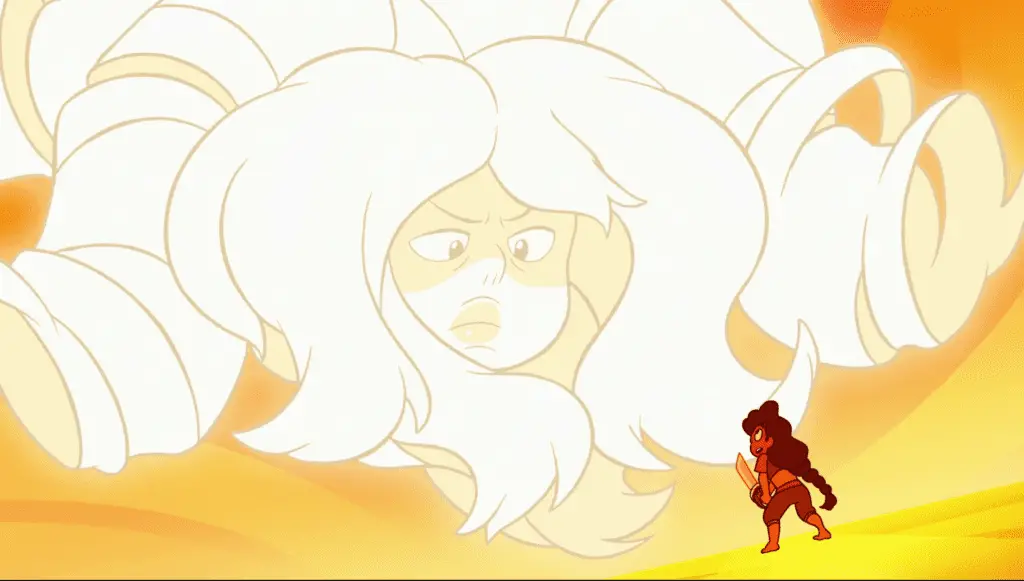
Speaking of balance, their mothers’ mixed legacy looms large in their character arcs. Steven coming to grips with the messy truth about Rose has occupied much of his character growth over the course of seasons 3 and 4. When we first ‘met’ Rose’s legacy, she was a near mythic figure in the minds of the Crystal Gems and Greg. Tragedy and grief loomed large, and cast a rose colored tint to her life and work.
She was a rebel who led a revolt against the Evil Homeworld to protect human life and give it space to flourish. She was a collector of outcasts and misfits. Anyone could find a place and space to be themselves by her side. To Pearl she was an object of adoration, to Garnet, a leader to idolize. To Amethyst, she was the one who accepted her and to Greg, a woman to love and start a family with. She literally gave up her life to create Steven. A figure of romance, strength, and passionate, principled idealism, Rose was a hero whose shoes young Steven felt obligated to fill.
“For my whole life, I’ve been hearing stories about you. About how amazing you were. That you were so kind and loving. And every time I’d see the painting hanging of you in the temple, I’d be inspired. And reminded of how much I had to live up to.” — Steven, to projected image of Rose (4.17, “Storm in the Room”)
But while that mythic story had kernals of truth, that did not reflect the full picture of Rose. Although nurturing and compassionate, other war stories paint her as a ruthlessly efficient warrior and leader of the rebellion. We can’t forget that Rose is a Quartz gem, which we’ve been consistently shown are soldier types. While she may have been designed primarily as defensive, hence the shield for her gem weapon, she doesn’t lack for offensive ability. The extensiveness of her arsenal and training regimen prove she did not take fighting lightly. She may have been a reluctant fighter (we don’t know that fully either way), but she was skilled. One could even call her cocky, given the glimpse we got of her fighting in “The Answer” (2.22).
She also shattered Pink Diamond. We do not know the circumstances surrounding this act as of yet, but it’s a huge blow to the spotless image Steven received regarding his mother’s sense of righteousness and compassion. That isn’t to say someone can’t both be compassionate and value human life as well as be willing to take a life. In fact, that’s precisely the tension Steven (and the audience) must grapple with and accept.
“I finally know the truth. I know what you are! You’re a liar! I thought you’d never want to hurt anyone! You hurt everyone! How could you just leave Garnet, and Amethyst and Pearl, and-and Dad?! They don’t know what to do without you! Maybe they didn’t matter to you as much as hiding the mess you made! And that’s why I’m here, isn’t it?! Did you just make me so you wouldn’t have to deal with your mistakes?! Is that what I’m all here for?” — Steven, to projected image of Rose (4.17, “Storm in the Room”)
Bit by bit the heroic icon of his mother’s identity and legacy has been strained. Not quite to the breaking point. This is no nihilistic, wanton destruction of the hero archetype. Rather, Steven’s struggle to synthesize the moral complexity of his mother’s life and choices more closely mirrors a human child’s process of accepting their parents as more than the sum of their positive traits.
It also puts his journey toward self identity in a new light. He must shed the notion of ‘living up to his mother’s legacy’ and instead pursue living up to his own choices and ideals. He cannot ‘be Rose’, either for himself or anyone else. Yes, he has to wrestle with what she left behind, but as himself, as Steven.
Kara has had to face the truth about her father to a lesser degree (see 2.08, “Medusa”), but, like Steven, her mother’s mixed legacy has taken up a significant part of her hero journey. Supergirl S1 revolved around it via Kara’s conflict with Astra and Non.
As a child, Alura likely represented the best of Kryptonian society to Kara. A prominent judge and powerful woman in her own right, Kara looked up to her mother as a paragon of ‘truth, justice, and the Kryptonian way’. On the surface, her aunt Astra symbolized the opposite of that: a criminal, warlord, and eco-terrorist condemned to prison in Fort Rozz. A simple ‘good twin/bad twin’ dichotomy right? Order/chaos. Crime/punishment. Conformity/rebellion.
“According to the A.I. of my mother, Astra’s idea of helping people on Krypton was blowing up government buildings.” — Kara, to Alex (1.08 “Hostile Takeover”)
“Did you care about the people you and your fanatic husband killed?…My mother was the best woman who ever lived.” — Kara, to Astra (1.08, “Hostile Takeover”)
“Your mother would be proud you’ve chosen to follow in her footsteps…Your mother dealt out true justice against the scum of our galaxy. She was a great woman.” — Master Jailer, to Kara (1.14, “Truth, Justice, and the American Way”)
Only it’s not that simple, as Kara comes to recognize. Astra’s attempts to recruit Kara to her cause include shedding light on the truth behind her imprisonment and Alura’s involvement. Kara learns that not only did her mother hide the truth about Krypton’s immanent destruction from Kara, she used Kara to draw Astra out of hiding and get her arrested. Rather than work with her twin sister to save Krypton, Alura imprisoned her.
It’s not quite as simple as Alura prioritizing justice and punishing those who worked outside the law over saving the planet, though. Alura acknowledged the correctness of Astra’s cause; Krypton needed saving. Only, Alura disagreed with Astra’s extreme methods. She could not ignore the death of a guard at Non’s hands while under Astra’s orders. Alura typifies a kind of absolute justice, but not one without reason. Likewise Astra embodies a controlled form of resistance to authority and one with worth ends, if flawed means. They’re two sides of the same coin really: the moral complexity of noble goals taken to extreme. It’s a sympathetic situation from all perspectives, as with Rose, Bismuth, and Pink Diamond.
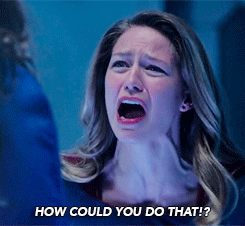 Like Steven, Kara responds to the truth about he mother’s morally ambiguous choices initially with rage and fear. As someone who has long thought of herself as one of the last children of Krypton and the heir to her mother’s legacy of justice and truth, recognizing moral ambiguity in that legacy leads to confusion and anger.
Like Steven, Kara responds to the truth about he mother’s morally ambiguous choices initially with rage and fear. As someone who has long thought of herself as one of the last children of Krypton and the heir to her mother’s legacy of justice and truth, recognizing moral ambiguity in that legacy leads to confusion and anger.
“You let everyone that I love die! You left me! You left me alone! You sent me away! How could you do that?” — Kara, to Alura’s A.I. (1.08 “Hostile Takeover”)
“She lied to me.” — Kara, to Alex re her mother (1.08 “Hostile Takeover”)
Like Steven, Kara recognizes that her mother’s choices hurt a lot of people, herself included. Like Steven, facing the complexity in her mother’s choices begins with an oversimplification—‘you lied’, ‘you don’t care’, ‘you abandoned me/us’—laced with personal pain. Learning your parents can hurt you inadvertently isn’t easy in the most straightforward of circumstances. And both Kara and Steven have to face not only what their mothers’ actions mean for them personally, but also for the legacy they’ve left. Rose and Alura affect not just how Steven and Kara view themselves, but also how the perceive their place in the world as heirs to those actions. It’s not just ‘you hurt me’, it’s also ‘who am I if you are a part of me’?
Note that both Kara and Steven were put into a similar situation as their mothers and have to face making the same, or at least similar, choice. Steven chose to same as his mother, that imprisoning Bismuth was better than shattering her or letting her roam free. Kara also chose to imprison her aunt with the help of the DEO, just as Alura had. When Astra escapes, Kara attempts to talk her aunt down, choosing redemption over force, just like Steven. With Astra’s death, however, we’ll never know if Kara would have been forced to more permanently imprison as Alura chose to do.
Note also that they’re grappling with their mothers, not their fathers, the latter of which is more common in superhero shows. Also, both shows take care not to demonize the mothers. They aren’t evil. They’re nuanced and complex mothers with sympathetic, if not always morally straightforward, perspectives. This makes Kara’s and Steven’s struggle acute, compelling, and deeply human even if neither of them fully are.
Furthermore, the question of ‘who am I if you are a part of me’ shapes how both Kara and Steven move forward in their growth. In a way, we’re still in the midst of seeing that growth. I’m not one to speculate on a normal basis, but no matter what, I think both Kara and Steven will become more nuanced, more empathetic, and more gracious people after the dust has settled. Given their commitment to second chances, I have a hard time believing that their respective existential crises about their mothers will lead anywhere but to greater emotional depth.
Strong In The Real Way
Compassion and a desire to heal and help others forms the fundamental core of Steven Universe and Kara Danvers. They’re hopeful, enthusiastic, and optimistic about life and others. They know what it is to suffer grief and loss, and wish to prevent that suffering as much as they can. They’re emotional problem solvers and natural mediators. While it can veer perilously close to meddling, like Steven with Lars or Kara with Cat and her son, they mean it kindly. They’re hardly controlling or interfering; they simply want to help other people and don’t always know the appropriate boundaries around what that should look like. They’re both aliens after all, remember?
For Kara, empathy stems from intimate experience with trauma. She lost her family, culture, planet, and history in one fell swoop. Clark does not seem to have played a significant part of her upbringing, so she grew up isolated from the one person who shared her ancestry. Yet even if he had been more involved, he wouldn’t remember Krypton. His culture is academic to him; it’s personal to her. She’s a living relic in that way, the only one who remembers her culture for what it was. That’s one heck of a burden on top of her grief.
A literal alien and survivor of planetary destruction, Kara’s first instinct as a child was still to help others in need. Jeremiah and Eliza Danvers taught her to suppress her physical powers, but that did not dull her urge to show compassion or help. As mentioned earlier, she views her job at CatCo as a way to help people, a way to influence people to choose their better angels. Her own struggles and pain fuel her desire to be a hero in any way she can.
The same applies to Steven. Though his experiences involve less direct personal trauma, he still grew up in the shadow of his mother’s death. He feels responsible for her death and guilty that she’s not around to lead the Crystal Gems, even if he also knows it was her choice. He may not be the last of his kind, but he’s the only one of his kind, and that isolates him from both humans and gems. Steven doesn’t quite fit in anywhere, just like Kara. And he sees a lot of his family and friends in pain, yet never allows that pain to warp him or turn him inward. Even when he’s floating in space with little hope for rescue (3.25 “Bubbled”), his first instinct leads him to reach out to Ruby.
They’re both like that. Though it might veer toward the naive, their belief that everyone deserves a second chance is an integral part of who they are. They’re talk first, punch things if I have to heroes. When given an opportunity to talk down an antagonist rather than fight one, they’ll take it. And if no such chance exists already, they’ll make one. Whether it’s Jasper and the Cluster or pretty much any antagonist on Supergirl, our heroes believe everyone deserves a second chance.
Such opportunities create unlikely friendships or partnerships, such as when Kara and Livewire together take down the dude who imprisoned her (2.10, “We Can Be Heroes”). Or, Steven’s friendship with Onion, or Lars, or Centipeetle.
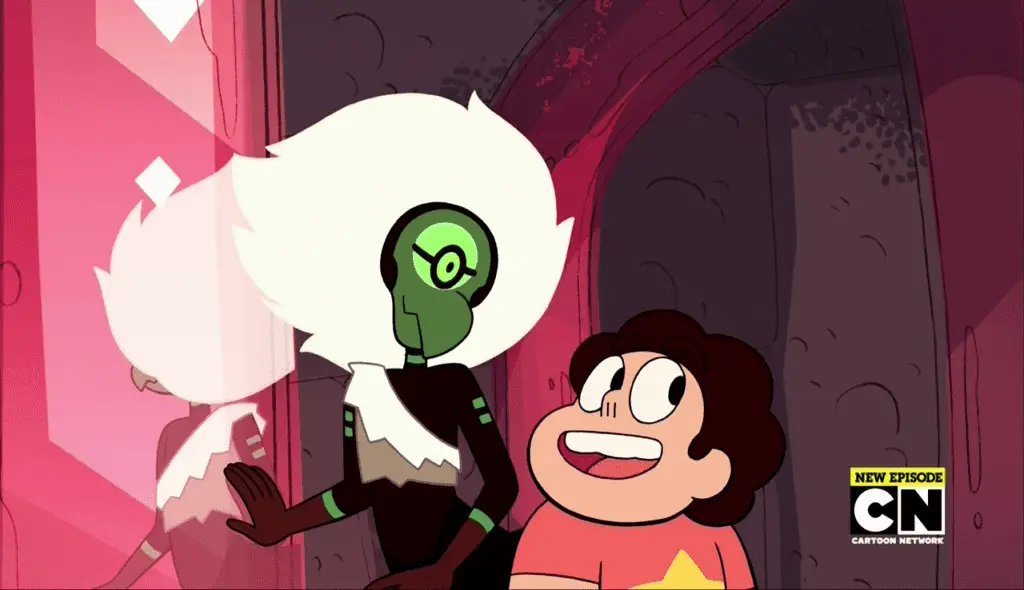
More than anything, their belief in people’s better angels inspires others to be better and to heal. Kara inspires the best in Cat Grant, Maxwell Lord, Mon-El, and even General Lane. She stood by Lena and defended her when no one else would, inspiring the Luthor to make a clean break from her family and be her own hero more than once (2.08 “Medusa”, 2.12 “Luthors”, and 2.15 “Exodus”).
Her desire to see the best in others fosters an environment where others do the same. Winn stands by and believes in Lyra in the face of pretty damning evidence that she’s a serial con man and thief who doesn’t care about him. Alex urges J’onn to open up and forgive M’gann, which then inspires M’gann to return home and offer the same healing and compassion to her people. No matter their history, Kara believes in second chances, and those around her do the same because she symbolizes that change.
Steven creates space for Peridot’s redemption arc as well as her and Lapis’ healing arcs. Without him, Centipeetle would not have made the progress she did, and I firmly believe that one of Steven’s main trajectories will be the discovery of how to bring healing to corrupted gems like Centipeetle and Jasper. Rather than fight the cluster, he talked to it. Seeing the gem shards’ pain, he encouraged them to find healing and love in each other rather than lash out. He’s resolved feuds between the Gems and the Pizzas, the Pizzas and the Frymans, and will hopefully play a significant part in resolving the conflict between Homeworld and Earth. He also helped Greg and Pearl to process their grief and move on in a healthy way.
In short, they’re not just superpowered heroes, they’re healers. Compassion, empathy, and belief in others are their primary ‘weapons’ if you will. Only when those fail do they resort to punching things or whipping around a giant yoyo. True strength, for them, requires a willingness to be vulnerable to harm themselves. Talking down an antagonist leaves them open to attack, but they’d rather take a blow themselves than fail to offer up the chance to heal. Violence is a last, defensive resort rather than a primary objective or ‘power up’ tool. Empathy is empowerment, not revenge.
Flawed in A Relatable Way

Despite what my gushing may lead you to believe, neither Kara nor Steven are perfect. They make mistakes in how they pursue helping others and using their powers. Kara can be overzealous in her pursuit of justice, like her mother, especially when her family is in danger. Her belief in the best of others can lead to an overly negative response when their flaws inevitably surface. High expectations can bring out the best in others, but also be a source of conflict if the person fails to meet her standards. Her abandonment issues have created conflict with her loved ones, this season especially, but hopefully we’ll see resolution by the end of the season. She also struggles with anger and will lash out if she doesn’t take time to work through it.
Steven’s genuine love for everyone can blind him to potential conflict among other personalities, like when he blithely offers to let Navy stay with Peridot and Lapis (4.20, “Room for Ruby”). Believing the best of others doesn’t mean everyone will get along, and just because someone is trying doesn’t mean the injured party is ready to accept their apologies. Steven’s desire for harmony can become conflict avoidance or inadvertently put too much pressure on others to ‘heal faster’. He doesn’t always recognize that not every wound heals right away. His desire to see others grow can become controlling if he thinks he knows what’s best for them (2.17, “Sadie’s Song”).
Yet for all that they are alien or half alien beings, Steven and Kara are deeply human characters. Many of their weaknesses stem from good intentions or even positive character traits, like Kara’s desire for justice or Steven’s desire for harmony. They’re not exaggerated flaws or Dark Secrets™. Then again, most human beings don’t have a single glaring Character Flaw™ that never changes. Rather, they have a collection of faults and foibles typically rooted in a good (or at least understandable) place, only taken to one extreme or the other. Kara and Steven are the same, which makes them intimately relatable despite their powers.
Need I Say More?
These specific aspects to their characters and arcs just scratch the surface of how deeply similar Kara and Steven are. I could talk about how they’re both surrounded by powerful, strong, and diverse women who help, encourage and challenge them. Or how they’re best friends with diverse people and draw them all in to work together. Or about how they both defy the lone wolf stereotype and specifically set out to work as part a team, Kara even going so far as to work for the government rather than apart from it as her cousin does.
Though both ‘adopted’ in some way, both had relatively stable home lives that became a source of safety and encouragement for them in the outside world. Such stability seems to have mitigated, at least partly, the effects of being alienated and different from the rest of society. For coming from such complicated backgrounds, they’re both fairly well adjusted. Due in large part to the unconditional love and acceptance they received from their immediate family. Still, found family plays a large part of each of their stories. Their family network extends beyond blood ties to emotional ones. The theme of true family being the ones that loves and accepts you while also challenging you to be your best self plays heavily in their arcs and the arcs of the secondary characters around them.
Both challenge the tropes associated with superheroes by being unabashedly positive, feminist, and anti-toxic masculinity. Steven’s very existence smashes multiple tropes like the Smurfette principle and boys don’t cry. Steven prefers many feminine coded things without shame, and everyone loves him for it in canon. If you want to see what the opposite of toxic masculinity looks like, I give you Steven Universe.
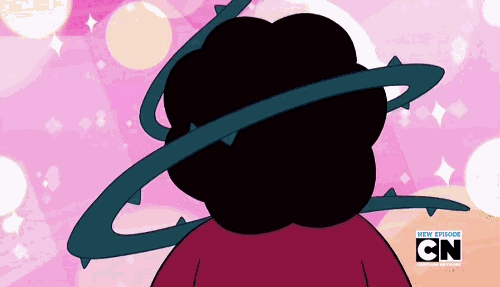
And if you want more surface comparisons, they both have/had a ‘love interest’ who is a person of color (James, Connie). They both have at least one canonically queer relative (Alex, Garnet, Pearl, Rose). Oh, and they both have a great cast of supporting characters that are as real and nuanced as they are. Given that Steven has Lion, just give Kara her cat Streaky and we’re set.
They Give Us Hope
Kara and Steven approach the world with an optimism and enthusiasm that defies the Dark and Gritty pall that so often colors superhero shows. They look in the face of Grimdark ‘Realism’ and laugh. Nihilistic shows push the message that the world is irrevocably fucked up and cannot be changed. Kara and Steven look at a broken, hurting society and see how it can be better if we’re all willing to be stronger together.
I firmly believe that the personalities of the protagonists set the tone for the show. It is no surprise then, that Supergirl and Steven Universe are hopeful shows that can touch on deep things without being Dark™, because the heroes value empathy, second chances, hope, and being strong in the real way. Therefore, the shows can handle delicate issues like trauma, healing, grief, mental illness, queer identity, reconciliation, and genocide with the sensitivity and respect they deserve. Rather than devolve into rape revenge fantasies or moral bankruptcy, these shows choose hope and healing. Redemption arcs mean something because we get to see all the work involved. Every step is earned.
Small wonder, too, that they’re both proudly feminist shows. Both heroes subvert the stereotypical lone wolf angst ridden and/or self righteously lonely hero whose pain is as much a burden as it is a foundation. They both value balance, communication, family (found and otherwise), and teamwork. They’re shows so ensemble focused that sometimes secondary or even tertiary characters have just as powerful an arc as the hero (M’gann/J’onn and Lapis/Peridot). Both shows value diversity in storytelling and characters. Though Supergirl not as consistent with that this season, it had its bright spots with Lyra, M’gann, and Maggie.
They’re shows where stoic space parents (J’onn and Garnet) can have some of the most moving emotional scenes, and the nerds (Winn and Peridot) are consistently the funniest damn characters. They’re also some of the most visually colorful shows around, which I do not think is a coincidence given their hopeful tone.
In other words both the heroes themselves and the shows they lead break and subvert tropes. Stereotypical arcs or tropes stand out more because the background is different. Bold black lines show up more dramatically against a more subtly, delicately shaded portrait. A villain like Rhea feels too one dimensional for Supergirl. The lack of follow up with Bismuth grates more when we have character arcs like Peridot’s to compare hers to. Put differently, sand in your shoe at the beach is less annoying than a piece of cat litter in your sock at an art museum (not that I have any experience with that or anything…).
I think that’s because Kara and Steven themselves flaunt convention. As the heroes, they bend their universe’s realities to their feminist ways, or ought to do so, without it seeming strange or bad. In fact, the opposite is true. They create such radical spaces for themselves, their world, and other characters that our reality is shown for what it is: flawed, intolerant, but capable of change. And I think that’s exactly how Kara and Steven would want us to see the world, because everyone deserves a chance to choose their better angels and heal.
